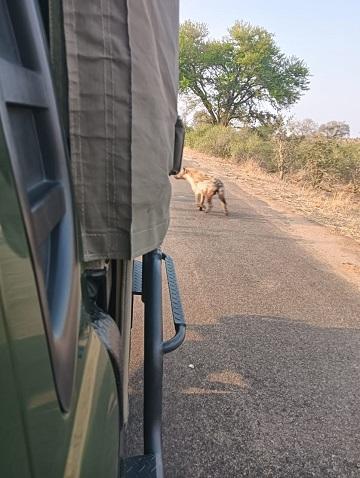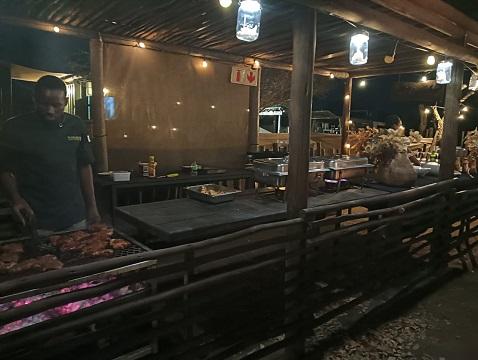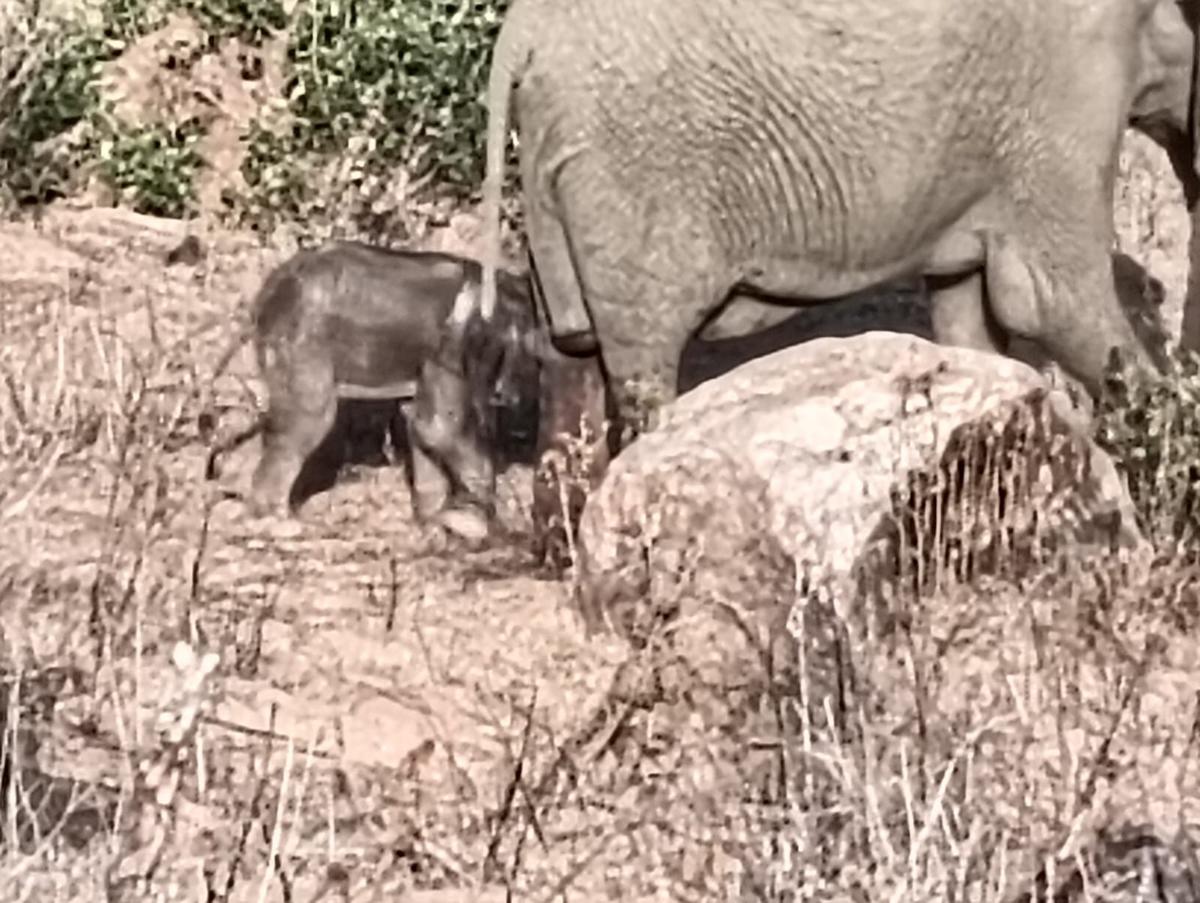|
Ama-Zing African Safaris Blog Wednesday, September 10 2025
If you’ve ever been on safari in Kruger National Park, you know the thrill of waking up before sunrise, grabbing your camera, and setting off in search of Africa’s most iconic wildlife. But sometimes, the stars align, and you find yourself in the middle of a sighting streak you’ll never forget. That’s exactly what happened recently — four different hyena sightings, all in one morning, between 06:00 and 12:00! Hyenas: The Misunderstood Predators of KrugerSpotted hyenas are often unfairly labeled as scavengers, but in truth, they are skilled hunters with complex social structures. In Kruger, they are a common yet fascinating sight, known for their intelligence, haunting calls, and powerful jaws. Seeing one hyena in the morning is lucky. Seeing four? That’s pure safari magic. The Morning Hyena Highlights
Why Morning Drives Are the Best in KrugerEarly hours are prime time for predator activity in Kruger. Hyenas, lions, and leopards often use the cool morning air to patrol, hunt, or return to their dens. By midday, most predators rest in the shade, making early drives the best opportunity for sightings. Tips for Spotting Hyenas in Kruger National Park
Final ThoughtsWhether it’s Sunday, Monday, or any day, Kruger has a way of surprising you. Four hyena sightings in one morning proves that every safari is different, and nature always has the final say. If you’re planning your trip to Kruger National Park, make sure you set that alarm clock — the hyenas might just be waiting for you. Monday, September 08 2025
There is nothing quite like a Bush Braai in Kruger National Park – a once-in-a-lifetime African safari experience that combines the thrill of a night game drive with a traditional outdoor dinner under the stars. Recently, we were treated to one of the most memorable evenings imaginable with Ama-Zing African Safaris, and it was filled with incredible wildlife encounters, breathtaking sunsets, and the warm crackle of the campfire. A Game Drive Full of SurprisesOur evening began with a drive through the heart of Kruger National Park, where the bush came alive with activity. The first highlight was a magnificent leopard, resting in the shade and blending perfectly with its surroundings. Just moments later, we came across three powerful cheetah brothers, a rare and thrilling sighting. The excitement didn’t stop there – a lioness appeared soon after, and as dusk fell, a herd of gentle elephants passed quietly through the bush. As the sun set in a blaze of orange and gold, we were treated to the sight of a pride of lions, including three young males and a lioness, preparing for the night ahead. On the way to the Bush Braai site, the nocturnal world revealed itself. We encountered hyenas on the road, spotted two white-tailed mongoose, and admired the night sky glowing above the vast Kruger wilderness. The Magic of the Bush BraaiArriving at the Bush Braai boma, the scene was set with lanterns, crackling fires, and the irresistible aroma of meat sizzling over the coals. Guests enjoyed a traditional South African braai – a feast of grilled meats and delicious sides – while surrounded by the sounds of the African night. The experience was both rustic and luxurious, blending the raw wilderness with warm hospitality. After dinner, the night became even more fascinating. Guided by torchlight, we discovered a scorpion glowing under UV light on a nearby tree, a reminder of the many hidden wonders of Kruger’s ecosystem. A Night to RememberAs we left the Bush Braai area, the sightings continued. Hyenas appeared again, this time three together on the road, followed by three separate genet sightings – agile nocturnal predators darting through the darkness. And of course, throughout the drive we enjoyed sightings of Kruger’s everyday residents: impala, kudu, giraffe, and many more. Why Choose a Bush Braai with Ama-Zing African Safaris?A Kruger National Park Bush Braai is more than just a meal – it’s an adventure that combines thrilling wildlife encounters with authentic South African culture. The chance to see predators after dark, listen to the sounds of the bush while dining outdoors, and explore the nocturnal world makes it a truly unique safari highlight. Whether you’re a seasoned safari-goer or visiting Africa for the first time, this experience will leave you with memories to last a lifetime. Book your Kruger Bush Braai with Ama-Zing African Safaris today and experience the wild side of dining in Africa! Saturday, September 06 2025
One of the most unforgettable moments on our recent Kruger National Park game drive was witnessing the majestic Cape Vulture feeding her chick high up in a tree. These incredible birds are not only breathtaking to watch, but also play a vital role in the African ecosystem. As we drove through the wilderness of Kruger Park, our guide pointed out a large nest perched precariously at the very top of a tree. With binoculars focused, we realized we were looking at a Cape Vulture (Gyps coprotheres) tending to her young chick. Watching her carefully feed her little one was a truly special and rare experience—something not every visitor gets to see. The Cape Vulture, also known as the Cape Griffon, is one of Africa’s largest vultures with an impressive wingspan of over 2.5 meters. Sadly, these magnificent birds are listed as endangered, with populations declining due to habitat loss, poisoning, and power line collisions. Seeing a healthy mother and chick in the wild was a reminder of how important conservation efforts are in protecting these incredible birds. Vultures play a critical role in the ecosystem by cleaning up carcasses, preventing the spread of disease, and keeping the natural cycle in balance. Cape Vultures prefer to nest on high cliffs or tall trees, safe from predators. From our vantage point, we watched as the adult vulture carefully tore small pieces of food and gently passed them to her hungry chick. The nest itself, made of sticks and branches, was perfectly positioned to give the young vulture a strong start in life. Every safari in Kruger National Park is different—you never know what you’ll encounter. While many visitors hope to see lions, elephants, or leopards, it’s these unique moments—like a Cape Vulture feeding her chick—that make the experience truly unforgettable. It was a breathtaking reminder of the diversity and beauty that Kruger Park has to offer. Our Kruger safari gifted us with an extraordinary sight: a mother Cape Vulture nurturing her chick in the wild. For bird enthusiasts, photographers, and nature lovers alike, this was a highlight that will stay with us forever. If you’re planning a visit to Kruger National Park, keep your eyes on the treetops—you may just be lucky enough to witness something as rare and beautiful as this. Friday, September 05 2025
Visiting Kruger National Park is always an unforgettable adventure, but this trip turned out to be even more magical than I could have imagined. As I drove through the dusty tracks, keeping my eyes open for wildlife, I stumbled upon an incredible sight — a newborn elephant calf, still wobbly on its feet, alongside its mother. And here’s the kicker: I had only just missed the birth! A Once-in-a-Lifetime Safari MomentThere it was — tiny, fragile, and still glistening from birth, taking its first uncertain steps next to its protective mother. The little elephant stayed close to her side, trying to make sense of its brand-new world. Even though I arrived moments too late to witness the actual birth, being able to see a calf this young was an extraordinary privilege. In fact, spotting such a fresh arrival in the wild is something that even the most seasoned safari-goers rarely experience. Only Armed With My PhoneOf course, in moments like these, I wished I had my camera with me. But as luck would have it, all I had was my phone. Still, I snapped away, capturing the tiny calf clumsily following its mother. The photos may not be professional quality, but they hold the raw beauty of the moment — proof that sometimes, the best safari experiences happen when you least expect them. Why This Sighting MattersElephants are the heart of Kruger Park. Watching a newborn reminds us of the importance of conservation — every calf represents hope for the future of the species. Seeing the start of a new life in the wild is a humbling reminder of how precious and fragile these ecosystems are. Final ThoughtsI may have missed the actual birth, but being able to witness one of Kruger’s newest elephant calves just minutes after entering the world is a memory I’ll carry forever. It’s moments like this that make every safari unique — you never know what magic is waiting around the corner. So next time you’re in Kruger National Park, keep your eyes open. You might just witness the beginning of a new life. |
Ama-Zing African Safaris / Ama-Zing Kruger Park Safaris
Marloth Park / Hazyview, Kruger National Park, Mpumalanga, South Africa
Phone: +27 74 031 3825
Marloth Park / Hazyview, Kruger National Park, Mpumalanga, South Africa
Phone: +27 74 031 3825








